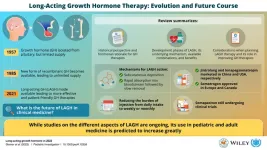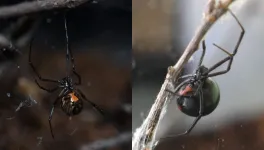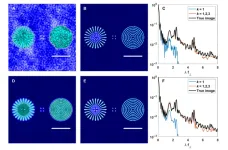(Press-News.org) How strongly a vaccine protects you may depend on getting enough sleep in the days before and after inoculation, finds a new meta-analysis examining the relationship between sleep duration and the body’s response to vaccination.
Sleeping fewer than six hours per night around the time of vaccination was associated with a robust decrease in antibody response, according to the multi-institution study published March 13 in Current Biology. Adults are typically recommended to get between seven and nine hours of sleep per night.
The meta-analysis included data on the association between sleep duration and antibody responses for the influenza and hepatitis vaccines. While comparable data on COVID-19 vaccination were not available, researchers said their study highlighted the need to identify simple behavioral interventions, such as sufficient sleep, that could improve the response to COVID-19 vaccination amid the ongoing pandemic.
The weakened antibody response in those with shortened sleep was so profound, it was similar to the decline in COVID-19 antibodies two months following vaccination with the Pfizer-BioNTech or Moderna shots.
“We have previously found that cognitive behavioral therapy, as well as mindfulness, robustly improve insomnia and also normalize various aspects of immunity, although it is not yet known whether insomnia treatment can augment vaccination responses,” said Michael Irwin, MD, a study co-author and director of the Cousins Center for Psychoneuroimmunology at the Jane and Terry Semel Institute for Neuroscience and Human Behavior at UCLA.
The researchers also examined the data by sex, since women typically have a stronger vaccination response than men. There was a robust association between sleep duration and antibody response in men, but they said more data are needed for women because the studies did not control for variations in sex hormone levels, which are known to affect immune function.
Large-scale studies are also needed to determine when people should get sufficient sleep to promote an optimal vaccine response around the time of inoculation, the researchers said.
Other authors include Karine Spiegel, Amandine E. Rey, Anne Cheylus, Kirean Ayling, Christian Benedict, Tanja Lange, Aric A. Prather, Daniel J. Taylor, and Eve Van Cauter. The authors declared no competing interests directly related to this study.
END
Too little sleep could make vaccination less effective
Better sleep could play an important role in the COVID-19 vaccination effort, new research suggests
2023-03-13
ELSE PRESS RELEASES FROM THIS DATE:
Not getting enough sleep could blunt antibody response to vaccination, leaving you more vulnerable to infection
2023-03-13
In reviewing data from previous studies, a team lead by researchers at the University of Chicago and the French National Institute of Health and Medical Research (Inserm) found that individuals who had fewer than six hours of sleep per night in the days surrounding vaccination had a blunted antibody response. That indicates efforts to promote heathy sleep duration ahead of an immunization could be an easy way to improve vaccine effectiveness. The study was published March 13 in Current Biology.
The latest work builds off a 2002 study by members of the team showing that restricting sleep ...
A new immune pathway sheds light on ALS
2023-03-13
While drugs are on the market to slow the progression of neurodegenerative diseases, there are still no cures. But researchers at Boston Children’s Hospital and Harvard Medical School are looking for new pathways for slowing neuronal dysfunction and treating amyotrophic lateral sclerosis (ALS), a fatal motor neuron disease. The team found that proteins involved in the innate immune system could be at the root of the disease.
“The unmet need for therapies for neurodegenerative diseases is huge, and our work opens up a whole new ...
Study shows how biodiversity of coral reefs around the world changes with depth
2023-03-13
SAN FRANCISCO, CA (March 13, 2023) — In a paper published today in Current Biology, researchers from the California Academy of Sciences Hope for Reefs initiative, along with Brazilian collaborators from the University of São Paulo, Federal University of Espírito Santo, and the Instituto Nacional da Mata Atlântica, show that mesophotic coral reefs function much differently than their shallower counterparts and are unlikely to offer a refuge for shallow water fishes trying to escape climate-change driven warming on the ocean’s surface.
The research is based on hundreds of dives totaling ...
Benefits of the net-zero emissions strategy for Nepal
2023-03-13
Achieving the goals of the Paris Climate Agreement will require the combined efforts of states and companies around the world. How can developing countries achieve carbon neutrality and boost their resilience while pursuing economic growth and improved living standards? A study by the Research Institute for Sustainability (RIFS) draws on the example of Nepal to analyse the benefits of a net-zero emissions strategy.
Nepal is among the 10 countries most vulnerable to climate-change-related disasters and risks. However, its contribution to global greenhouse gas emissions is minor. As Nepal prepares to graduate ...
Pediatric Investigation review takes stock of history and current status of long-acting growth hormone therapy
2023-03-13
In 1957, Maurice Raben successfully isolated and purified the growth hormone (GH) from the pituitary gland, opening up a potential avenue of GH therapies. Children who were born with a deficiency of this hormone could now receive medical intervention in the form of daily injections to substitute the product into their body, thus avoiding the ill-effects of GH deficiency. However, given that it was a product that had to be meticulously extracted from the pituitary of dead bodies, and was time-consuming as well as labor- and resource-intensive process, it remained ...
Towards a novel 3D covalent organic framework with record large pores for efficient drug delivery
2023-03-13
Materials science is constantly evolving research area as researchers strive to discover and synthesize novel functional materials with desirable properties suited to a variety of applications. One example on this front is furnished by covalent organic frameworks (COFs), a class of materials characterized by crystalline porous polymers connected in the form of a network via covalent bonds.
Owing to their structural diversity, high porosity, and easily accessible active sites, COFs can be designed for a range of applications such as gas storage and separation, catalysis, and drug delivery. ...
Equipping employers to address costly health inequities, improve workforce well-being
2023-03-13
Embargoed until 8:00 a.m. CT / 9:00 a.m. ET Monday, March 13, 2023
DALLAS and ALEXANDRIA, Va., March 13, 2023 — Health inequities can be detrimental to employees’ emotional, psychological and physical health and place a significant economic burden on employers. To improve employee well-being and reduce health inequities nationwide, the American Heart Association—a global force for longer, healthier lives for all—introduces the Health Equity in the Workforce initiative in collaboration with the Deloitte Health Equity Institute and the Society for Human Resource Management (SHRM) Foundation.
The Health Equity ...
Too hot to handle
2023-03-13
Metal organic frameworks, or MOFs, are kind of like LEGOs.
The pieces are simple to connect, yet they’re capable of building highly sophisticated structures. These structures can be used to filter toxic gasses out of the air or to store fuel for natural or hydrogen gas-powered engines.
LEGOs melt when they interact with heat. But, what happens to MOFs?
A new study from the University of Pittsburgh Swanson School of Engineering found that MOFs heat up significantly when they soak up gasses and if they ...
Brown widow spiders' aggression likely driver of black widow decline
2023-03-13
Annapolis, MD; March 13, 2023—Black widow spiders have earned a fearsome reputation for their venomous bite. But in parts of the southern United States these spiders have much to fear themselves—from spider relatives who really don't like their company.
In the past couple decades, researchers have noticed black widow spiders commonly being displaced by the brown widow, a fellow species in the same genus, Latrodectus. But new research suggests this isn't a just simple case of one species winning the competition for food or habitat. Instead, a study shows brown widow spiders have a striking propensity to seek out and kill nearby ...
The best of both worlds: a new algorithm fuses quantum and classical information for high-quality imaging
2023-03-13
Researchers from Colorado State University and the Colorado School of Mines have thought up a new computational imaging strategy that exploits the best of both the quantum and classical worlds. They developed an efficient and robust algorithm that fuses quantum and classical information for high-quality imaging. The results of their research were published Dec. 21 in Intelligent Computing, a Science Partner Journal.
Recently, the quantum properties of light have been exploited to enable superresolution microscopy. While quantum information brings new possibilities, it has its own set of limitations.
The researchers’ approach is based on classical and quantum ...
LAST 30 PRESS RELEASES:
Scientists reveal our best- and worst-case scenarios for a warming Antarctica
Cleaner fish show intelligence typical of mammals
AABNet and partners launch landmark guide on the conservation of African livestock genetic resources and sustainable breeding strategies
Produce hydrogen and oxygen simultaneously from a single atom! Achieve carbon neutrality with an 'All-in-one' single-atom water electrolysis catalyst
Sleep loss linked to higher atrial fibrillation risk in working-age adults
Visible light-driven deracemization of α-aryl ketones synergistically catalyzed by thiophenols and chiral phosphoric acid
Most AI bots lack basic safety disclosures, study finds
How competitive gaming on discord fosters social connections
CU Anschutz School of Medicine receives best ranking in NIH funding in 20 years
Mayo Clinic opens patient information office in Cayman Islands
Phonon lasers unlock ultrabroadband acoustic frequency combs
Babies with an increased likelihood of autism may struggle to settle into deep, restorative sleep, according to a new study from the University of East Anglia.
National Reactor Innovation Center opens Molten Salt Thermophysical Examination Capability at INL
International Progressive MS Alliance awards €6.9 million to three studies researching therapies to address common symptoms of progressive MS
Can your soil’s color predict its health?
Biochar nanomaterials could transform medicine, energy, and climate solutions
Turning waste into power: scientists convert discarded phone batteries and industrial lignin into high-performance sodium battery materials
PhD student maps mysterious upper atmosphere of Uranus for the first time
Idaho National Laboratory to accelerate nuclear energy deployment with NVIDIA AI through the Genesis Mission
Blood test could help guide treatment decisions in germ cell tumors
New ‘scimitar-crested’ Spinosaurus species discovered in the central Sahara
“Cyborg” pancreatic organoids can monitor the maturation of islet cells
Technique to extract concepts from AI models can help steer and monitor model outputs
Study clarifies the cancer genome in domestic cats
Crested Spinosaurus fossil was aquatic, but lived 1,000 kilometers from the Tethys Sea
MULTI-evolve: Rapid evolution of complex multi-mutant proteins
A new method to steer AI output uncovers vulnerabilities and potential improvements
Why some objects in space look like snowmen
Flickering glacial climate may have shaped early human evolution
First AHA/ACC acute pulmonary embolism guideline: prompt diagnosis and treatment are key
[Press-News.org] Too little sleep could make vaccination less effectiveBetter sleep could play an important role in the COVID-19 vaccination effort, new research suggests




